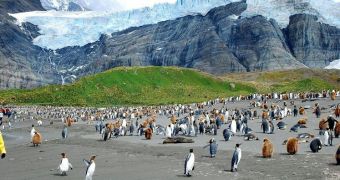The Galapagos Islands, a group of islands isolated in the middle of the Pacific Ocean, and now officially a UNESCO World Heritage Site, may have less biodiversity than the sub-Antarctic island called South Georgia, which is only now beginning to reveal the myriad of species it houses.
Charles Darwin is primarily responsible for making the Galapagos so well known. The species living at this location inspired the great scientist to write his renowned book “On the Origins of Species.”
Until recently, it was widely considered to be the most biologically-diverse place on Earth. But the archipelago might soon lose that title to South Georgia, given the recent discoveries made on the latter.
It would appear that the waters surrounding this island, which is located in the Southern Ocean, are teeming with more species than Galapagos holds. This identifies South Georgia as one of the most important ecosystems on the entire planet.
The island itself is not very big, at just 105 miles (170 kilometers) in length. It has a surface area about three times higher than that of Hong Kong, and is also relatively unknown to the general public.
“It looks like a giant has picked up the Alps and plonked them down in the middle of the Southern Ocean – beautiful,” explains British Antarctic Survey marine ecology researcher Oliver Hogg.
Many of the hundreds of species the BAS survey found this location were not identified anywhere else in the world, ever. The continental shelf surrounding South Georgia covers more than 17,000 square miles (44,000 square kilometers).
“Last November, expert divers from the shallow marine survey group based in the Falkland Islands acted on our behalf to conduct the biggest exploration of South Georgian waters for 85 years,” the BAS expert adds.
“Divers braved conditions of 0 degrees [Celsius] [32 degrees Fahrenheit] to collect samples from the northern waters of South Georgia,” he goes on to say, adding that the area around the island is the richest in species in the entire Southern Ocean.
“Based on current data, South Georgia supports many more species than Galapagos and Ecuador combined. During the breeding season, it hosts the densest mass of marine mammals on Earth,” Hogg goes on to say, quoted by Our Amazing Planet.
“In terms of other Southern Ocean islands, South Georgia also had the added benefit of not having its shelf completely covered during the last ice age,” the scientist says.
“As such, its wildlife has been able to colonize and evolve relatively undisturbed for longer than other islands,” he concludes.

 14 DAY TRIAL //
14 DAY TRIAL //